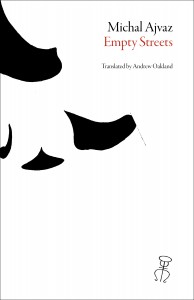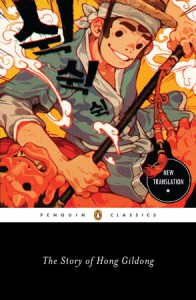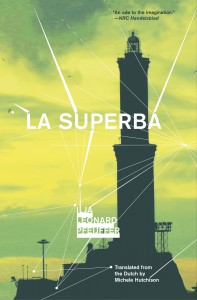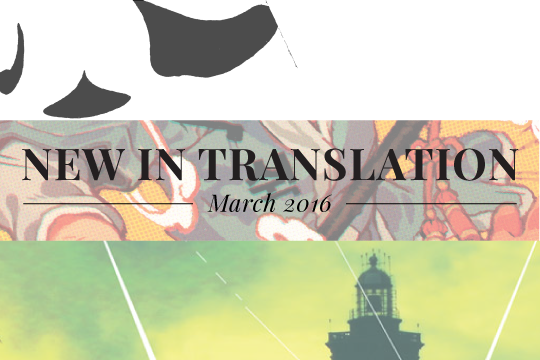Michal Ajvaz, Empty Streets (Dalkey Archive). Translated by Andrew Oakland—review by Ellen Elias-Bursac, Contributing Editor

Empty Streets, originally published in Czech in 2004, sets its writer-protagonist out on a search for a missing woman. However, in typical Ajvaz fashion, the quest begins as a search for a mysterious symbol. Early in the novel, the unnamed narrator stumbles, literally, on a double trident, a three-foot-long object that pierces his foot while he’s walking through a dump. This kicks off a sequence reminiscent of “This is the house that Jack built”: a double-trident logo appears a few days later when the narrator is using his friend’s computer; the friend tells the story of spotting the symbol in a mysterious painting; the owner of the painting, an elderly literary professor, tells him about the work of art and also adds a story about the disappearance of his daughter, whom he asks the narrator to find; the search takes him to the painter, who tells the narrator a story about . . . and so on, from one playful and inventive twist to the next, through 14 stories over the course of 470 pages.
In keeping with the novel’s sense of abundance, the prose brims with sensory experience in passages that translator Andrew Oakland renders with delicacy and precision. Notably, Oakland also leaves room for the narrator’s lack of precision, in instances like the “strange fragrance, one that is terribly difficult to describe” which he says has “several components including the scent of roses and the sharp smell of steel.” Similarly, when describing sound, the narrator says he “unpicked from the blocks of silence various rustlings, creakings, something somewhere knocking into something, something rolling around something and then stopping, something pointed that was scratching, something crumbling”—all noises that “might have been tiny sounds on the outer wall of a house, or a din softened by a great distance.”
But most pervasive are images of light and shadow, such as the observation of a sunset descending on the city, leaving only the upper-floor balconies in sunlight: “I had the feeling I was looking up at a distant shore from the bottom of a deep lake whose waters were crystal-clear.”
A remarkably creative, joyfully strange work, Empty Streets is also about creative and strange works of art, particularly the writings, musical compositions, paintings and sculptures of a group of Czech conceptual artists from the 1960s. One of them, a writer, conceives of the creative process as “a brittle emptiness whose cracks produced a story that was still in the process of hatching from the egg of the void,” with each story “soft-boiled, remaining at a stage when it had the form of a rhythmical rippling and pulsing, out of which objects, bodies, spaces, actions and thoughts were yet to emerge in full.”
It is tempting to apply the same description to Ajvaz’s novel as a whole, with its richness of intriguing imagery, characters and stories repeatedly breaking in on the “emptiness” as conjured by the title, but with a narrative that only gradually emerges, “hatching” through its many layers.
***
The Story of Hong Gildong (Penguin Classics). Translated by Minsoo Kang, author anonymous—review by Ryan Mihaly, Interview Features Editor

The Story of Hong Gildong, as translator Minsoo Kang explains in his introduction, is a work of mass-market fiction from 19th century, Joseon dynasty Korea. It tells the story of a lowborn son (born of a government official and his concubine) who possesses extraordinary powers and wants nothing more than to become a high-ranking official in the King’s court. But the law forbids lowborn men to hold any position of power, and social customs dictate that lowborn children are to be scorned. This is the central drama of this action-packed story, a popular dynasty-fantasy in which no obstacle can stop our magical underdog, Hong Gildong, from ascending to power—the sort of tale that appeals to modern Korea, Kang argues, because the story of a secondary son trying to overcome the limitations, disadvantages and oppression his society has set upon him “has become the story of modern Korea itself.”
In its less than 100 pages, The Story of Hong Gildong also provides a quick, albeit rich, glimpse into some of Korea’s foundations. As Gildong makes his way around the kingdoms of Korea, ditching his family, learning magic, recruiting bandits, stealing from corrupt officials (and also, at one point, from a temple—crossing the line into ethically dubious acts) to build a kingdom of his own, he often refers to ancient Chinese rulers who had influence on the land, religious and military texts, the wisdom of poets, the lunar calendar, and Confucian proverbs. Kang maintains a very even, lucid translation of the action-driven prose, while supplying over a hundred notes for the reader eager to learn more.
Penguin Classics, which chose Gildong as its first classic to be translated from Korean, calls this fast-paced page-turner a “Robin Hood story.” This is one way of looking at it. However, as Kang points out in the introduction, Gildong is hardly an anarchist or a moral hero seeking justice for the poor—he actually wants imperial power, but he can’t get it by traditional means because of his status as a secondary son. By the time Gildong builds his own island empire and invades another kingdom in the name of progress and power, we are rooting for this precocious, magical kid. Or are we? The book is wonderfully complex, rich with moral questions, and an easy read, like a fairy tale.
But one major reviewer writing about the book alerts us that readers are entering “The Land of Translation” and wraps up the review sardonically: “If you read only one book about Korean heroic outlaws this season, this should be the one,” knowing full well this will be the only book about Korean heroic outlaws English readers may see this season, maybe for years. There are several other action-packed, heroic stories from 18th and 19th century Korea, which Kang lists in his introduction: “The Story of Jo Ung,” “The Story of Su Daeseong,” “The Story of Yu Chungryeol,” “The Story of Jeon Uchi.” When will they be translated into English? What moral dilemmas do they contain?
When people talk of “The Land of Translation”—where funny-sounding phrases in English come from terms that don’t carry over well from the original—I’m reminded of the strangeness of English. In Korea, there were dynastic offices called the Office for the Deliberation of Forbidden Affairs and the Office for Dispensing Benevolence. If that seems strange, don’t forget the United States’ military headquarters is housed in a building called the Pentagon.
***
La Superba by Ilja Leonard Pfeijffer (Deep Vellum). Translated by Michele Hutchinson—review by Lindsay Semel, Educational Arm Assistant

“It was the white hour after lunch, the blank page upon which some secret language could be scribbled in pencil, something that should be rubbed out again instantly as soon as the shutters were raised and life started again in black and white with profits, proceeds, and protests.”
This sentence — which, in its original Dutch, won the 2013 Tzum Prize for the year’s most beautiful sentence written in the language — appears about a quarter of the way through Ilja Leonard Pfeijffer’s thoroughly compelling and lyrical novel La Superba, and gives a sense of its preoccupation with capital, privilege, and the subjectivity of human experience.
Pfeijffer’s narrator carries both the author’s name and biography as a writer who, having established some measure of prestige in the prosperous north, immigrates to Genoa. The city, known as “la Superba” for its proud past, functions in the novel as a geographical and metaphorical gateway between Africa and Europe, North and South. It is a limbo space in which the narrator-protagonist Ilja wanders the streets, observing the people and patterns of life, recording (and in some sense taking ownership of) the stories of some of the city’s more colorful inhabitants.
Ilja’s wanderings make him a witness to migrant experiences very different from his own, as he becomes acquainted with a number of African immigrants living in dire poverty in Genoa. A recent Senegalese immigrant tells him of an unsuccessful attempt to cross the Mediterranean in a rubber raft with 51 other people and only two bottles of water. “How much black ink do you need to write down our dreams on black paper?” he asks the narrator. A tenant of a decrepit building such as often houses recent arrivals from Africa, he later interprets for Ilja a sticker found on most such housing: “Do you know what that means? I’ve looked it up in my dictionary. It’s the joke of the century. It means that pest control is underway and it’s inadvisable to touch the bait.”
If the “bait” that triggers migration is the dream of financial security (or even glory, as in some of Ilja’s envisionings of the lives of past Genoans who left home only to wind up in poverty elsewhere), Ilja’s motivation seems to be the opposite, as he attempts to wake himself up from the complacency that comes with living in comfort and familiarity in the north. The “better life” he aspires to would involve escaping his shame as a privileged literary artist, or rather, the shame of being irrelevant outside the narrow window in which his privileged status exists. But Ilja, like some of the other European immigrants he encounters in Genoa, finds it difficult to connect with authentic experience, and instead slides into more and more desperate confrontations with the sources of his own escapism.
Boundaries between reality and fantasy break down. Ilja, throwing himself into a search for “the most beautiful girl in Genoa,” carries on a string of dalliances with local women—including those who are older, richer, drunker, and in one case, smellier, than he is—in addition to maintaining his slobbering idealization of a waitress in the Bar of Mirrors and a persistent fantasy over a severed female leg found in an alley early in the novel. Translator Michele Hutchison does a masterful job of rendering the devastating poignancy of these encounters into English.
The overall plot contains little action, but the narrator is a writer and does his job well. The stories related throughout La Superba are attention-grabbing and entertaining, sometimes surreal, and at times downright grotesque. But while flirting with the obscene, the novel’s rawness also manages to strike a sympathetic chord.
*****
Read more from New in Translation:

